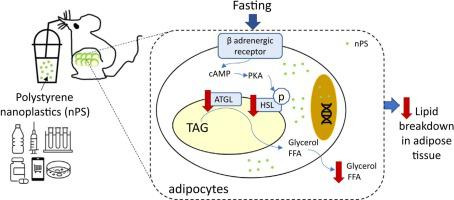Journal of Hazardous Materials ( IF 12.2 ) Pub Date : 2022-07-28 , DOI: 10.1016/j.jhazmat.2022.129698 Ho Ting Shiu 1 , Xiaohan Pan 2 , Qing Liu 2 , KeKao Long 3 , Kenneth King Yip Cheng 3 , Ben Chi-Bun Ko 2 , James Kar-Hei Fang 4 , Yuyan Zhu 5

|
The health concerns of microplastics (MPs) and nanoplastics (NPs) surge, but the key indicators to evaluate the adverse risks of MPs/NPs are elusive. Recently, MPs/Ps were found to disturb glucose and lipid metabolism in rodents, suggesting that MPs/NPs may play a role in obesity progression. In this study, we firstly demonstrated that the distribution of fluorescent polystyrene nanoplastics (nPS, 60 nm) white adipose tissue (WAT) of mice. Furthermore, nPS could traffic across adipocytes in vitro and reduced lipolysis under β-adrenergic stimulation in adipocytes in vitro and ex vivo. Consistently, chronic oral exposure to nPS at the dietary exposure relevant concentrations (3 and 223 μg/kg body weight) impaired fasting-induced lipid mobilization in obese mice and subsequently contributed to larger adipocyte size in the subcutaneous WAT. In addition, the chronic exposure of nPS induced macrophage infiltration in the small intestine and increased lipid accumulation in the liver, accelerating the disruption of systemic metabolism. Collectively, our findings highlight the potential obesogenic role of nPS via diminishing lipid mobilization in WAT of obese mice and suggest that lipolysis relevant parameters may be used for evaluating the adverse effect of MPs/NPs in clinics.
中文翻译:

膳食暴露于聚苯乙烯纳米塑料会损害高脂饮食喂养小鼠的脂肪组织中空腹诱导的脂肪分解
微塑料 (MPs) 和纳米塑料 (NPs) 的健康问题激增,但评估 MPs/NPs 不利风险的关键指标却难以捉摸。最近,发现 MPs/Ps 会干扰啮齿动物的葡萄糖和脂质代谢,这表明 MPs/NPs 可能在肥胖进展中发挥作用。在这项研究中,我们首先证明了荧光聚苯乙烯纳米塑料(nPS,60 nm)白色脂肪组织(WAT)在小鼠体内的分布。此外,nPS 可以在体外通过脂肪细胞运输,并在体外和离体脂肪细胞的 β-肾上腺素能刺激下减少脂肪分解. 始终如一地,在饮食暴露相关浓度(3 和 223 μg/kg 体重)下长期口服 nPS 会损害肥胖小鼠的禁食诱导的脂质动员,随后导致皮下 WAT 中脂肪细胞的大小增大。此外,nPS 的长期暴露会导致小肠中的巨噬细胞浸润并增加肝脏中的脂质积累,从而加速全身代谢的破坏。总的来说,我们的研究结果通过减少肥胖小鼠 WAT 中的脂质动员强调了 nPS 的潜在致肥胖作用,并表明脂肪分解相关参数可用于评估临床中 MPs/NPs 的不利影响。











































 京公网安备 11010802027423号
京公网安备 11010802027423号